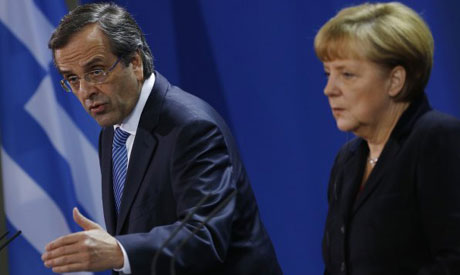
German Chancellor Angela Merkel and Greece's Prime Minister Antonis Samaras attend a news conference after talks at the Chancellery in Berlin, November 22, 2013 (Photo: Reuters)
German Chancellor Angela Merkel and Greek Prime Minister Antonis Samaras said on Friday they saw "light at the end of the tunnel" for Greece thanks to painful reforms.
After talks in Berlin, Merkel hailed "impressive facts" and "significant progress" in reducing the country's mountain of debt due to the "sacrifices of the Greek people".
"I would like to underline, there is light at the end of the tunnel," she told reporters, after Samaras used the same upbeat phrase in his opening remarks.
"We are seeing preliminary success -- it is not an easy path -- but I have full confidence in the Greek government and its prime minister."
Greece unveiled a budget this week in which it said the deep recession in the economy would end next year with 0.6 percent growth, following a 4.0-percent contraction in 2013.
However auditors from the International Monetary Fund, the European Central Bank and the European Commission concluded their latest visit to Greece to review progress on the country's economic programme without reaching a full agreement, according to an IMF statement.
Such audits determine whether or not Greece receives the next instalment of rescue funding, with the troika now expected to return to Athens in early December.
The troika predicts a 2014 fiscal gap will exceed 1.5 billion euros ($2.0 billion), while the Greek government estimates the sum to be slightly more than 500 million euros.
Merkel said regardless of which figure panned out, the fiscal gap was "not huge".
Samaras insisted he had not come to Berlin cap in hand with a request for an easing of the bailout conditions.
"The current agreement is on track, we are on track, we don't ask for anything else," he said. "We are doing our part of the deal and we believe that everybody should keep doing their part of the deal."
Greece lurched into recession when the global economic crisis hit in 2008, and by 2010 rising borrowing costs on its massive debt forced Athens to seek a bailout from the EU and IMF.
Two bailouts, worth up to 240 billion euros plus about 100 billion euros in a debt write off, helped stave off a feared breakup of the euro and kept the Greek state financially afloat.
Merkel has insisted Germany, as the EU's bailout paymaster, can only succeed within a strong and globally competitive Europe.
She has championed a tough love approach toward Athens, providing financial relief in return for painful spending cuts, which has made her the target of angry protests in Greece.
Short link: